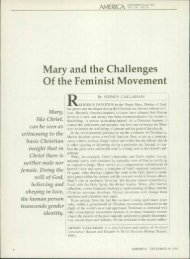You also want an ePaper? Increase the reach of your titles
YUMPU automatically turns print PDFs into web optimized ePapers that Google loves.
CURRENT COMMENT<br />
Taking a Beating<br />
Millions around the world looked on with horror last<br />
month as women in Pakistan and Afghanistan became subject<br />
to Sharia law, Taliban-style. A cellphone video of the<br />
flogging of a 17-year-old girl, encircled by male onlookers in<br />
Pakistan’s Swat valley, made a spectacle of the Wahhabist<br />
leaders’ disregard for women’s rights and highlighted the<br />
Pakistan government’s role in ceding control of the region.<br />
The Afghanistan parliament also passed a law that was<br />
signed by President Hamid Karzai, but which, after international<br />
protest, is now being “reconsidered.” The law<br />
would prohibit any Shiite woman from working or attending<br />
school without her husband’s permission; it would also<br />
require her to make herself up and to have marital relations<br />
whenever her husband desires it. Critics say it legalizes<br />
“marital rape.” Shiites are a minority in Afghanistan<br />
(about 10 percent of the population). Hundreds of schools<br />
for girls have just been closed.<br />
Remarkably, 300 mostly young and courageous Afghan<br />
women organized a public protest in Kabul, demanding<br />
that the law be repealed. The local police protected the<br />
women protesters from the much greater number of men<br />
who opposed them on the streets. What will become of<br />
those women? Will their number grow? Will they be made<br />
an example? Can the United States and the world community<br />
protect such women, especially during wartime? Until<br />
better tools are devised, the old ones must be used: monitoring<br />
women’s welfare, continued media coverage of their<br />
fate, urging lawmakers to keep equal rights in the constitution<br />
and legal system, extending safe harbor to imperiled<br />
individuals who seek it. Women and their human rights<br />
should not have to take a beating while the world looks on.<br />
I Dreamed a Dream<br />
At last count, the YouTube video of Susan Boyle singing<br />
on the British television show “Britain’s Got Talent” has<br />
been seen by a jaw-dropping 60 million viewers. (That is<br />
probably up another few million by now.) Ms. Boyle, an<br />
unemployed, unmarried, unprepossessing woman from a<br />
remote village in Scotland, is a devout Catholic who spent<br />
the last few years quietly caring for her ailing mother, who<br />
recently died at 91. And when she strode on stage to sing<br />
“I Dreamed a Dream,” a poignant song from “Les<br />
Misérables,” the judges visibly smirked—until she opened<br />
her mouth. She silenced them with her glorious voice.<br />
What accounts for the astonishing interest in Ms.<br />
Boyle? A cheer for an unlucky person given a lucky break?<br />
Perhaps. But there may be more. The way viewers are seeing<br />
Susan Boyle is like the way God sees us: worthwhile,<br />
special, talented, unique, beautiful. The world generally<br />
looks askance at people like Susan Boyle, if it sees them at<br />
all. Without classic good looks, without a job, without a<br />
spouse, living in a small town, people like her may not<br />
seem “important.” But God sees the real person and the<br />
value of each person’s gifts: rich or poor, young or old, single<br />
or married, matron or movie star, lucky or unlucky in<br />
life. God knows us. And loves us.<br />
Susan Boyle’s story recalls Psalm 139. Every person, no<br />
matter what his or her talents, is “fearfully and wonderfully<br />
made.”<br />
Quality of Life<br />
Apostolic visitations are initiated by the Vatican in<br />
response to grave problems. The visitation of U.S. seminaries,<br />
completed this January, was in response to the sexual<br />
abuse crisis. The visitation of the Legion of Christ,<br />
announced in March, will investigate issues of “truth and<br />
transparency” linked to sexual abuse and financial malfeasance<br />
by the order’s founder. But what grave problems<br />
prompted two other recently announced visitations: one of<br />
the Leadership Conference of Women Religious, the other<br />
of all women’s religious orders in the United States?<br />
The L.C.W.R., which represents 95 percent of women’s<br />
orders in the United States, is being investigated for theological<br />
reasons, mainly because of annual assemblies in<br />
which speakers addressed topics on priestly ordination, the<br />
universality of salvation and homosexuality. Yet the<br />
L.C.W.R. is a loose consortium of women’s religious<br />
orders, not a governing body, much less a theological<br />
school. Some of the underlying impetus for the visitation<br />
may be gleaned from an address given last year at Stonehill<br />
College in Massachusetts by Cardinal Franc Rodé, C.M.,<br />
the Vatican’s point person for religious life, in which he<br />
criticized the orders’ “disastrous” decisions after the Second<br />
Vatican Council, which he called “pseudo-aggiornamento”<br />
and said led to declining vocations.<br />
It is hard not to feel sympathy toward the women religious<br />
being investigated for their “quality of life.” Vatican II<br />
instructed women religious to revisit their original<br />
charisms, reinvigorate their work with the poor (as their<br />
foundresses had done) and update their way of life. They<br />
did so—in fidelity to the council documents. We hope<br />
that this fidelity, as well as the rest of their astonishing<br />
contributions to the church, will be acknowledged by<br />
Vatican investigators.<br />
4 <strong>America</strong> May 11, 2009









